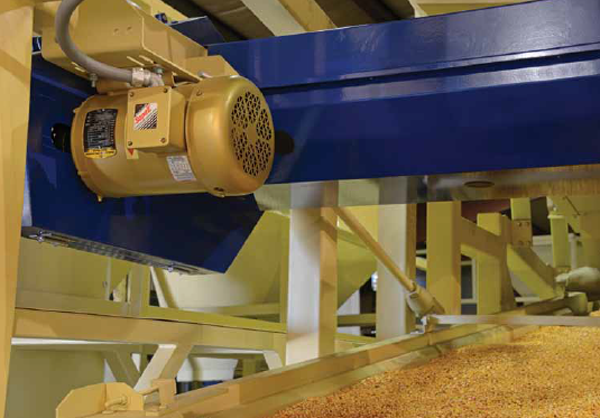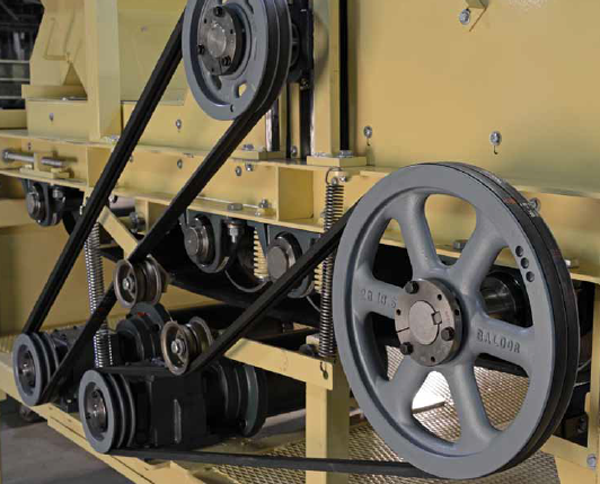LMC Manufacturing Poised for Major Growth

Chooses Baldor as its global partner
More than 70 years ago in rural Georgia, Lewis M. Carter developed the concept for the modern peanut sheller. Today, 100 percent of the U.S. peanut crop and a large percentage of the almond crop is processed by LMC equipment.
The company, still run by the Carter family, is now taking its proven technology and applying it into the growth markets of seed, grain, and other pulse crops like chickpeas, beans, and lentils. Currently 60 percent of LMC’s business is export, but with its rich heritage of innovation and a trusted global partner, LMC is prepared for major growth around the world.
L. Marcus Carter III is company vice president and the fourth generation to work at LMC. He says what makes the company unique is its systems approach: the capability to design, build, deliver, and install all of the equipment required to crack, hull, clean, size, and grade products directly from the field, preparing them as food ingredients. But the key to the company’s growth, according to Carter, is custom engineering.
“We take the time to listen to the customer to find out what they expect the machines to do,” says Carter. “We find ways to take their ideas and then build the machines to their specifications. We work hard to give the customer what they want, making sure they have what they need to efficiently clean and process their product.”
While the company was growing, the family determined several years ago that to prepare for major global growth, it needed to find one supplier that could meet all its needs, both in North America and around the world. One reason they chose Baldor, according to Carter, is that the family found a company that worked the same way it does and shares the same values.
“We both take the systems approach, which means we can rely on Baldor for the whole gamut of mechanical and electrical products we need,” says Carter. “Working with Baldor means we have one source for help, and we don’t have to go to eight or ten different people to get answers. Baldor supports us the way we support our customers, and that’s what makes us similar.”
Carter also says product reliability was another selection factor and says they can count on Baldor motors, gearboxes and bearings to perform without fail. But it was Baldor’s global reach that helped LMC reach its final decision.
“It’s great that Baldor has support worldwide, especially as a member of the ABB Group,” says Carter. “It’s one more reason why we chose to partner with Baldor. We want to work with a company that can not only provide global products, but also offer us global support.”
Product quality and reliability was another factor that convinced LMC to choose Baldor as its global partner. This Baldor•Reliance Super-E® motor is powering a vibrating conveyor that is sizing popping corn.
It’s engineering support that is important to Chad Snellgrove, LMC’s R&D engineer. He is working on the next generation of equipment that will meet the demands that customers are making for machines that will move more product and move it faster. He not only appreciates the engineering advice but also likes working with a company that offers so many different types and styles of products, giving him a lot of design flexibility.
But what Snellgrove says he likes the best about working with Baldor is the easy access to critical drawings and other engineering information.
“I know the gearbox type and ratio I want to use, but I need to know if it will fit where I want to mount it on my machine,” explains Snellgrove. “In the past, I would have to take the time to look up all the dimensions in a catalog and draw something myself. With Baldor, I can pull the CAD drawing I need from the website, whether it’s a gearbox, motor or bearing, and stick it in my drawing. I can’t stress to you enough how beneficial this is for us and what a time-saver this is.”
Mike Woodall, LMC’s production manager, has also had positive experiences working with Baldor engineers, most recently with the bearing team developing a new product to fill an LMC need. Woodall says from an operations standpoint, standardizing on one supplier has many obvious benefits, like simplifying the purchasing process and managing inventory. He believes it’s the relationships you build that make the greatest difference.
“I have had the opportunity to visit two Baldor•Dodge plants to learn about lean manufacturing practices, bringing back ideas to incorporate into our facility,” says Woodall. “We have a real partnership. We don’t just look at Baldor as a product supplier; we have a good relationship that allows us to learn from one another.”
In today’s business climate of emerging nations, and with increased global demand for food, LMC is well-positioned to take its business to the next level. Carter says that he has no doubt that his company, with support from Baldor, will have an impact on feeding the world.
In addition to Baldor’s motors, gearing and bearing products, LMC has also standardized on Baldor’s mechanical power transmission component offering, including Baldor•Maska® and Baldor•Dodge sheaves and bushings.

